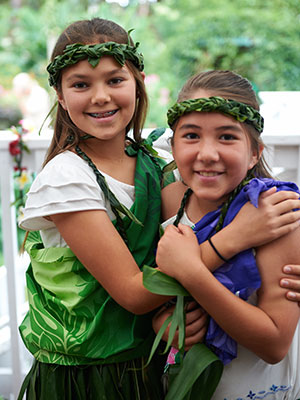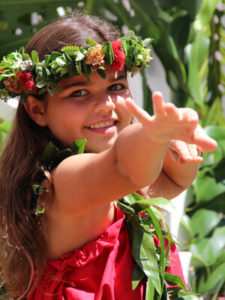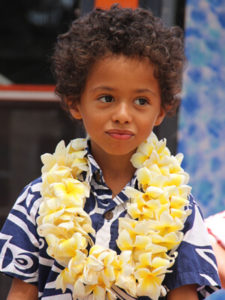
Our Hawaiian Studies curriculum is designed to inspire young learners to develop a deepened appreciation for their island home. As residents of Hawai‘i, our lives are interdependent, and we rely on one another to maintain our quality of life.
Hawaiians of old contended with many of the same challenges we face today: conserving natural resources, responding to limits, tolerating differences, and adapting to rapid change. We believe that when students examine the development of traditional Hawaiian society and attempt to understand its inherent values, they will be better able to make informed choices in their own lives that ultimately will improve the quality of life for all Hawai‘i’s people.
Hawaiian Studies is integrated into many areas of the curriculum, rather than taught as a separate class. Our goal is to expose students to aspects of the culture — including songs and chants, cultural beliefs and practices, the importance and history of the Hawaiian people, and the significance of place. In addition, Koai’a and Koa students learn about state history and geography, encompassing early Hawaiian life, voyaging and exploration, and cultural influences.
A cornerstone of Hawaiian Studies at WCS is our annual May Day Celebration. Students in all classes participate, learning hula and chants with our kumu hula. Students learn the meaning of the dances and songs, putting their performance in a cultural context that builds relevance and meaning. Students also learn about places and plants of our island, often contributing to the making of attire for the show. Our program is based on a deep appreciation and respect for Hawaiian culture, which is to be understood and valued.





Our program also parallels our Character Education Program by examining monthly values from a Hawaiian perspective.
The values we discuss during the first year of a 2-year cycle are:
Month:
- September
- October
- November
- December
- January
- February
- March
- April
- May
Hawaiian Value:
- Pono
- Kuleana
- Lokomaika‘i
- Mana‘o‘i‘o
- Kūpa‘a
- Aloha
- Na‘auao
- Olakino Maika‘i
- Ho‘omake‘aka
English Translation:
- Respect
- Responsibility
- Compassion
- Faith
- Commitment
- Love
- Wisdom
- Health
- Humor
In the second year, students learn about:
Month:
- September
- October
- November
- December
- January
- February
- March
- April
- May
Hawaiian Value:
- Kūpono
- Laulima
- Ha‘aha‘a
- Maluhia
- Ahonui
- Wiwo‘ole
- Makakū
- Mālama ‘Āina
- Ku‘oko‘a
English Translation:
- Honesty
- Cooperation
- Humility
- Peace
- Patience
- Courage
- Creativity
- Environmental Awareness
- Freedom
We believe that frequent discussion of these universal values as expressed within the context of the Hawaiian world view can have a positive impact in our classrooms by nurturing a consistent tone of moral awareness throughout the school.



